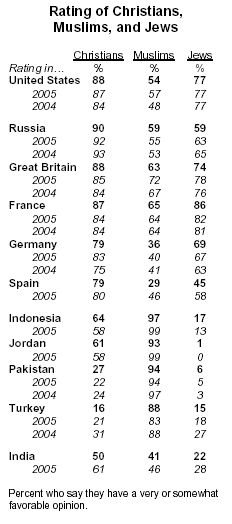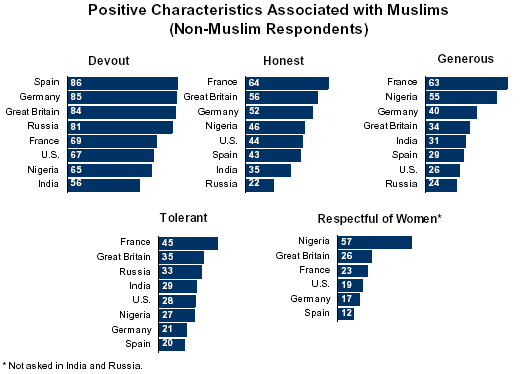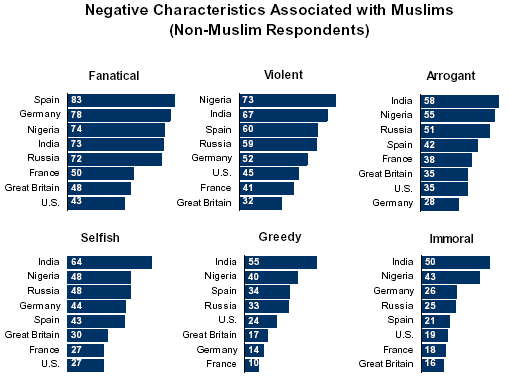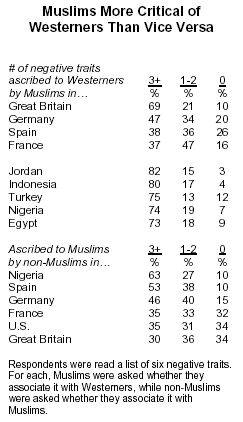
To explore how Westerners and Muslims see one another, we asked two batteries of questions. One is a simple favorability rating that focuses on religious and ethnic groupings; respondents were asked whether they have a favorable or unfavorable opinion of Muslims, Christians, Arabs and Jews. The second asked about a series of 11 character traits (greedy, fanatical, honest, tolerant, etc.); respondents in the West were asked if they associate these traits with Muslims, and Muslims were asked if they associate these traits with people living in the West.
The favorability measures show a troubled relationship between Westerners and Muslims, but the overall picture is more mixed than unremittingly negative. With only a few exceptions, attitudes among Western publics (toward Muslims) and Muslims (toward Christians) have remained fairly stable over the past few years.
Among Western publics surveyed, Spain stands out as the only one where positive views of Muslims have shown a steep decline – from 46% in 2005 to 29% currently. Spanish opinions of Jews – and of the United States and the American people – also have fallen sharply over the past year. (For more on global opinions of the U.S. and Americans, see “America’s Image Slips, But Allies Share U.S. Concerns Over Iran, Hamas,” June 13, 2006).
Similarly, there has not been a major change in how most Muslim publics view Christians, with the exception of Turkey. In Turkey, positive opinions of Christians have fallen from 31% in 2004 to 16% currently. Over that period, favorable views among Turks of both the U.S. and Americans have shown comparable declines.
Europe’s Muslims More Positive

A bright spot in Muslim-Christian relations is found in the attitudes of Muslims living in the West. By lopsided margins (91% among Muslims in France; 82% in Spain; 71% in Great Britain; and 69% in Germany), Muslims in Western Europe express favorable opinions of Christians.
Muslims in Western Europe have considerably more positive views of Christians than do Muslims living in Muslim countries. And in Spain and Germany, Muslims feel much more favorably toward Christians than the majority populations feel toward Muslims.
Roughly eight-in-ten Spanish Muslims (82%) express positive views of Christians, but just 29% of the general public in Spain expresses positive opinions of Muslims. The gap is substantial, though somewhat smaller, in views of how German Muslims regard Christians and how the German public sees Muslims (69% vs. 36%).
In the West, attitudes toward Arabs are mixed and track closely with attitudes toward Muslims. The British, however, hold somewhat less positive views of Arabs than Muslims (56% favorable for Arabs vs. 63% for Muslims). In the Muslim world, attitudes toward Arabs are strongly positive, with the exception of Turkey, a nation with a history of tensions with its Arab neighbors. There, attitudes towards Arabs are fairly evenly divided (46% favorable/40% unfavorable).
Opinions of Jews

Approval ratings for Jews remain strongly positive throughout the West, with the exception of Spain, where the favorability number has dropped to 45% from 58% a year ago. In the Muslim world, attitudes toward Jews remain starkly negative, including virtually unanimous unfavorable ratings of 98% in Jordan and 97% in Egypt.
Muslims living in Western countries have a more moderate view of Jews – still more negative than positive, but not nearly by the lopsided margins that prevail in Muslim countries. The Muslims in France are a special case: 71% have a positive view of Jews. This is the only Muslim population or sub-population surveyed whose opinion of Jews is more favorable than not.
Character Traits: Muslims View Westerners
To look more closely into the nature and nuance of the civilization divide, we asked non-Muslims to state whether they associate each of 11 different character traits with Muslims – and we asked Muslims the same set of questions about Westerners. The character battery includes five positive traits (generous, honest, devout, tolerant and respectful of women) and six negative ones (violent, greedy, fanatical, selfish, immoral and arrogant).
In general, Muslims living in predominantly Muslim nations delivered much more critical judgments about Westerners than non-Muslims gave regarding Muslims. (In this case, Muslims in Nigeria, who constitute nearly half of the country’s population, are included as a Muslim public). With just a handful of exceptions, majorities or pluralities of each Muslim public associate all of the negative traits on the survey – and none of the positive traits – with Westerners.
In particular, pluralities in all of the predominantly Muslim countries surveyed associate Westerners with being greedy, arrogant, immoral, selfish and violent. And solid majorities in Jordan, Turkey and Egypt – as well as a plurality of Muslims in Nigeria – view Westerners as being fanatical.

By the same token, in judging positive traits Muslim publics find little good to say about Westerners. A narrow majority of Nigeria’s Muslims (52%) say they associate Westerners with being generous. But that is very much an exception: otherwise, minorities of the Muslim publics surveyed associate the following traits with people who live in the West – generous, honest, devout, and tolerant. Also, fewer than half in all six Muslim publics surveyed say they associate Westerners with respect toward women.
For the most part, Western European Muslims surveyed express very different – and more positive – views of Westerners than do Muslims in Muslim countries (including Nigeria). Majorities or near majorities of Muslims living in Great Britain, France, Germany and Spain view Westerners as generous, honest, tolerant and respectful of women. Similarly, minorities of Muslims in these countries associate Westerners with being violent, greedy, fanatical, and immoral. However, Muslims in Western Europe do tend to see Westerners as selfish, with half or more Muslims in the four European nations saying they associate this trait with Westerners.

The Muslim minority population of Great Britain is an exception to this pattern. Across the full battery of questions, they have much more negative views of Westerners than do the Muslim minorities of Germany, France and Spain. Meanwhile, among those three countries, the Muslims in France and Spain have somewhat more positive views of Westerners than do Muslims in Germany.
Character Traits: Non-Muslims View Muslims
People in non-Muslim countries, including India and Russia as well as the U.S. and Western Europe, have mixed opinions of the characteristics associated with Muslims. Majorities of the general populations in all of the non-Muslim countries surveyed say they see Muslims as devout. Solid majorities of the French and Nigeria’s non-Muslim population also associate Muslims with being generous; far lower percentages in other non-Muslim countries agree.

But fewer than half in each of the non-Muslim publics associate Muslims with being tolerant. And with the exception of Nigeria, small minorities say they associate Muslims with respect for women. This is even in the case among the French, who generally have a more positive view of Muslims than do other Western publics.
On the negative side, majorities in five of eight non-Muslim publics surveyed associate Muslims with being fanatical and violent. But there are divisions of opinions about both of these characteristics. Several countries in the survey, by lopsided margins, associate Muslims with fanaticism, led by Spain (83%) and Germany (78%). Opinion in France, Great Britain and the U.S. is more evenly balanced, though half of the French and nearly as many Americans (43%) say they see Muslims as fanatical.

Muslims Much More Critical

On average, Muslims in predominantly Muslim countries are more likely to associate Westerners with multiple negative traits than vice versa. Indeed, 82% of Jordanians, and nearly as many Indonesians, Turks, Nigerian Muslims and Egyptians ascribe three or more negative characteristics to Westerners. In contrast, far fewer European Muslims – with the notable exception of British Muslims – link three or more negative traits to Westerners.
Among non-Muslim publics, 63% in Nigeria and 53% in Spain associate Muslims with three or more negative characteristics. But other non-Muslim publics are less critical of Muslims. In France, the U.S. and Great Britain, only about a third of respondents in each country associate Muslims with three or more negative characteristics; comparable percentages in each ascribe none of the negative characteristics listed to Muslims.




